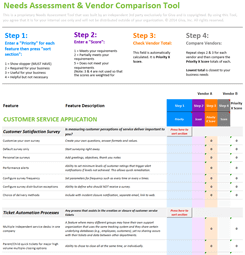Exploring the Future: Customer Service Industry Trends for 2025
Without question, we find ourselves at the heart of an ever-evolving era in the customer service industry. From the growth of cutting-edge AI to the personalization of customer experiences and the seamless connectivity of omnichannel support, these trends are fundamental in defining the future of customer engagement and service excellence.
This blog post presents the latest customer service industry trends, offering insights into their significance and practical advice on implementing them to elevate your business's customer service approach.

Key Customer Service Trends for 2025
-
Chatbots for More Flexibility and Cost Effectiveness
What is it?
Chatbots are AI-driven tools that automate customer interactions, primarily through instant messaging formats. In 2025, they are changing from simple and rules-based Q&A tools into more complex systems.
With them, AI can:
- Understand context
- Personalize responses
- And even detect emotions
Further, generative AI is allowing chatbots to use large knowledge bases and real-time analytics to help resolve more difficult customer issues without human intervention.
Why is it important?
These next-generation chatbots offer greater efficiency and cost-effectiveness by being able to handle a high volume of requests simultaneously.
They are also available 24/7, providing instant responses to customer questions and concerns. This not only improves customer satisfaction by reducing waiting times but also significantly cuts down on operational costs.
Also, as voice-enabled and multilingual features become standard, AI-powered chatbots will be able to serve a wider range of customers around the clock.
Lastly, according to Springs, chatbots are expected to bring substantial savings in customer service expenses, with predictions of retail consumer spending via chatbots reaching $142 billion in 2025.
In the end, these chatbots can:
- Help improve customer experiences
- Reduce overhead
- And give your organization a competitive edge
How can it be applied in your business?
Implementing chatbots in your business can be an effective way to enhance customer engagement and support. Regardless of your company size, you can start by integrating chatbot platforms with your existing CRM software and support systems. Adoption by smaller businesses can be relatively straightforward using third-party customer service bots. Larger businesses may opt for tailored in-house solutions. Pay close attention to data security and ethical AI practices, ensuring you handle sensitive information responsibly.
-
Omnichannel Support to Widen Your Reach
What is it?
Omnichannel support in 2025 is still about providing a seamless customer experience across various communication channels — like email, phone, social media, live chat, and chatbots.
Companies are also embracing newer platforms such as:
- Voice assistants
- Video conferencing
- And even Augmented Reality (AR) and Virtual Reality (VR) solutions for product demos or technical support
The goal remains the same: to provide consistent, contextual, and interconnected customer interactions, no matter which channel they choose.
Why is it important?
An effective omnichannel strategy helps customers switch between channels without losing conversation history or context. This "anytime, anywhere" approach builds customer trust and loyalty.
How can it be applied in your business?
To implement omnichannel support, start by:
- Identifying the most popular channels your customer demographic uses
- Choosing a robust CRM software or unified customer data platform to sync and create a single source and context for all customer interactions
- Training staff (and AI-driven virtual agents) to consistently present the same brand tone and empathy across channels
Finally, be sure to maintain compliance with changing data privacy regulations.
-
Personalization to Better Connect With Your Customers on a More Personal Level
What is it?
Personalization in 2025 involves making every touchpoint micro-subjective. This degree of personalization uses advanced AI algorithms, including generative AI, to create hyper-relevant customer service experiences in real time. This might include recommendations, communications, offers and support based on the customer's past behavior and predicted needs.
Why is it important?
Personalization is key to enhancing customer experiences and building stronger relationships. It shows customers that a business recognizes and values their unique preferences and needs. This can lead to increased customer satisfaction, loyalty, and potentially higher sales. Personalized experiences can significantly differentiate a brand in a crowded market.
How can it be applied in your business?
- Implement tools that consolidate and analyze customer data from multiple sources — including websites, mobile apps, social media, and in-store interactions
- Use predictive analytics to anticipate customer needs, and generative AI to deliver highly customized messages, offers and marketing campaigns
- Clearly communicate how you collect, store, and use data to build trust and encourage customers to opt in
- Continuously analyze performance metrics to fine-tune your personalization strategy
By using these strategies, you not only demonstrate to customers that you value their individual preferences, but you also increase the likelihood they will return — knowing they are treated as more than just another account.
-
Customer Success for a Proactive Journey
What is it?
The goal of Customer Success is to proactively make sure users of your product or service get the results they want. It's a strategy that goes beyond traditional customer service by working to anticipate customer needs and addressing them before they turn into problems.
Why is it important?
The significance of Customer Success lies in its ability to increase customer satisfaction, loyalty, and retention. It shifts the narrative from merely responding to issues to preventing them, improving long-term value for both the customer and the business.
How can it be applied in your business?
Implementing a Customer Success strategy involves:
- Closely monitoring customer behavior, gathering feedback, and using advanced analytics, AI, and automation tools to guide customers more effectively through their journey
- Training your team to recognize and act on opportunities to assist customers before they reach out for help is key
- Providing educational resources and regular check-ins to help ensure customers are making the most of your offerings
Read more: 15 Top Ways to Elevate Your Customer Service Strategy
-
Proactive Support to Anticipate Customer Concerns
What is it?
Proactive support entails identifying and solving customer problems before they occur or before the customer is even aware of them. Using advanced tools and technologies, such as AI-powered analytics, pain points can be predicted and preventive measures can be taken. This approach can significantly enhance the customer experience by minimizing frustrations and disruptions.
Why is it important?
By adopting a proactive approach to customer service, businesses can improve customer satisfaction and loyalty, reduce support costs, and enhance their brand reputation.
How can it be applied in your business?
You can apply proactive support in your business with the following:
- Use AI, analytics and customer feedback to identify trends, predict potential issues, and take preventive action based on customer behavior and past interactions
- Send out preemptive communications, via email, chatbots or in-app messages, about potential problems and their solutions
- Automate routine checks for common issues to make sure they are resolved before they impact the customer
- Provide AI-enhanced self-service tools, such as intelligent knowledge bases, FAQs, and virtual assistants, to empower customers to solve problems quickly on their own without needing to contact support
- Provide omnichannel integration so customers can receive proactive support across multiple touchpoints whenever they need it
Read more: 20 Top Strategies for Proactive Customer Service Plus Examples
-
Video to Enhance the Customer Experience
What is it?
Integrating video into customer service involves using:
- Video calls
- Tutorials
- Interactive demos
- Augmented Reality (AR)
- Overlays for troubleshooting
- AI-enhanced video content
All of the above can be personalized based on a customer's profile to make interactions more personal and informative. It provides a richer, more engaging customer experience.
Why is it important?
Video has the power to simplify explanations, bridge communication gaps, and foster a more personal connection with your brand. It makes it easier for customers to follow along and resolve their issues, resulting in satisfaction and loyalty.
How can it be applied in your business?
Incorporate video into your customer service in the following ways:
- Offer video chat options for support calls
- Create interactive video tutorials for common issues or product features. Include step-by-step video guides to show customers exactly how to resolve product issues or install new features in real time
- Utilize AI to automatically generate personalized video onboarding or product training for new customers
- Global Accessibility: Implement real-time translation and captioning tools to make video support accessible to diverse audiences
-
Customer Engagement to Create Two-way Communication
What is it?
Customer Engagement is a measure of a customer's emotional connection and interaction with a brand. It encompasses various forms of interaction, from purchases and website visits to social media exchanges and beyond. A highly engaged customer not only buys more but also promotes more, showing loyalty and advocacy for the brand.
Why is it important?
According to research done by GALLUP, engaging with your customers and staying tuned to customer sentiment leads to impressive outcomes: a 66% increase in sales growth, 25% boost in customer loyalty, over 10% rise in net profit, and a 20 percentile-point surge in customer confidence.
How can it be applied in your business?
- Utilize customer data to tailor interactions and communications. Personalization can significantly enhance the customer's connection with the brand
- Create and share engaging, interactive content — like polls, live streams, and short-form videos on social media platforms. This encourages two-way communication, allowing customers to share their thoughts, feedback and ask for support
- Reward customers for their engagement and purchases. Personalize rewards and offers using predictive insights. These programs can increase customer retention and turn occasional buyers into brand advocates
- Actively seek out and apply customer feedback via surveys, direct messages, or online reviews to improve products and services
- Use sentiment analysis and robust CRM tools to aggregate and interpret data
This not only improves the customer experience but also shows customers that their opinions are valued.
-
Customer Service to Strengthen the Brand Image
What is it?
This trend underscores the idea that customer service is not just a support function but a critical component of a brand's identity and value proposition. It measures the depth of a customer's emotional connection and interaction with a brand.
In 2025, customer engagement increasingly involves real-time, two-way dialogue, using advanced technologies like generative AI, immersive AR/VR, and community-driven platforms.
Why is it important?
Customers often remember a brand for the quality of service they receive. In fact, a study by PwC found that 73% of consumers point to customer experience as an important factor in their purchasing decisions. Excellent customer service can differentiate a brand in a competitive marketplace. This can foster loyalty and positive word-of-mouth. Think of it this way, when your customer service is good, you may not get a compliment. But bad service can certainly result in negative reviews and "one and done" customers.
How can it be applied in your business?
To make customer service a cornerstone of your brand:
- Ensure that every customer interaction on every channel reflects your company's values and mission, including emerging channels such as virtual reality or AI-driven chat
- Invest in training for your customer service team. Encourage empathy and creativity, so representatives can authentically reflect your brand's voice and values
- Adopt next-generation customer service technologies that streamline and enhance service delivery
- Use metrics like Net Promoter Score (NPS), Customer Satisfaction (CSAT), and sentiment analysis to measure customer satisfaction to continually improve service quality
-
Data Transparency to Build Trust
What is it?
Data transparency in customer service refers to openly sharing information with customers about how their data is collected, used, and protected.
Why is it important?
This transparency builds trust and loyalty, and reassures customers about their privacy and security. Demonstrating a commitment to privacy and ethical data use can communicate to consumers that you place a high priority on their privacy, especially in this digital age.
How can it be applied in your business?
Implementing data transparency can be straightforward but requires commitment to clear communication and ethical data practices. This includes:
- Creating easy-to-understand privacy policies
- Informing customers about data usage
- Complying with regulations and best practices (GDPR, HIPAA, CCPA)
- Maintaining robust security measures
- Offering them control over their personal information
-
AI to Streamline Service
What is it?
It is an understatement to say that Artificial Intelligence (AI) is transforming customer service. It can analyze vast amounts of data to provide insights, automate repetitive tasks, and deliver personalized customer experiences at scale. In 2025, generative AI and predictive analytics are enabling hyper-personalized customer interactions and proactive problem-solving.
Why is it important?
Its importance lies in its ability to enhance operational efficiency, reduce costs, and improve customer satisfaction. Advanced AI-driven technologies provide round-the-clock support, ensuring customers receive timely and relevant assistance.
How can it be applied in your business?
Incorporate AI into your customer service through the following:
- Chatbots and virtual assistants for instant support
- Predictive analytics for personalized service offerings
- Machine learning to continuously improve customer interactions based on feedback
AI can also streamline backend operations, allowing human agents to focus on other important issues.
-
Customer Feedback to Direct Service and Innovation
What is it?
Handling customer feedback involves collecting, analyzing, and acting on feedback from your customers. In 2025, this process utilizes more real-time analytics, AI-driven sentiment analysis, and advanced feedback channels, such as community platforms and in-app prompts, to gain deeper insights.
Why is it important?
It's a critical component of customer service that helps businesses understand customers' evolving needs, improve products and services, and make informed decisions.
How can it be applied in your business?
- Create multiple channels for feedback collection, such as social media, chatbots, online communities, and embedded product prompts to gather feedback in real time
- Use AI and analytics for deeper insights
- Analyze feedback for actionable insights and implement changes based on customer suggestions
- Close the feedback loop by thanking customers for their comments and informing them of any adjustments made as a result
- Promptly address customer concerns and publicly acknowledge common suggestions, as well as any resulting adjustments made
- Routinely release updates or new features to show customers their voices are heard
-
Remote Work for a Satisfied Customer Service Team
What is it?
Remote work, the practice of employees working from outside the traditional office environment, has become increasingly prevalent, especially in customer service. This shift gives customer service representatives the flexibility to work from any location, often leading to higher job satisfaction and increased retention.
Why is it important?
This flexibility can lead to higher employee satisfaction, reduced overhead costs, and access to a wider talent pool. For customer service, remote work enables support teams to provide assistance across different time zones. This can help ensure around-the-clock service without the need for physical call centers. A happier customer service team could mean better service for your clients!
How can it be applied in your business?
- Implement cloud-based customer service software, which allows your team to access necessary tools and information securely from anywhere
- Invest in ongoing training and communication programs to maintain team cohesion and service standards
- Ensure remote staff follow strict protocols, including VPN usage, secure data handling, and regular audits to meet data privacy regulations such as GDPR and CCPA
- Encourage work-life balance. Support flexible scheduling to accommodate different time zones and personal commitments. Providing such flexibility can prevent burnout and lead to better overall service quality
-
Messaging as an Emphasized Communication Channel
What is it?
In 2025, the increased use of messaging as a preferred customer service communication channel reflects changing consumer preferences for convenience and speed. It also gives the ability to maintain an ongoing conversation, no matter where they may be.
Why is it important?
Messaging platforms provide an immediate and accessible way for customers to reach out to a business. This shift underscores the need for companies to adapt to these platforms to meet customers where they are and offer support in real-time. This, in turn, can boost customer satisfaction and loyalty.
How can it be applied in your business?
Incorporate messaging services like SMS, WhatsApp or Facebook Messenger, as well as emerging apps such as Telegram and WeChat, into your customer service strategy. This offers additional, familiar and comfortable avenues for customer interaction. Integrate them with your Customer Relationship Management (CRM) systems for a seamless and personalized customer experience.
The Bottom Line: Stay Ahead with Current Customer Service Industry Trends
Keeping up with customer service trends is essential for delivering outstanding customer experiences. Leaving your customers with only an email address or phone number to get in touch with you is not going to go over well. Waiting 24 hours or more for a reply is a thing of the past. Ensuring you have an omnichannel support system and incorporating AI are essential first steps toward building a modern solution.
Provide Top-Notch Customer Service with Giva Ticketing Software
Giva's People & AI-Powered Customer Service Software directly addresses these trends by providing a robust, intuitive solution that enhances efficiency, ensures data privacy, and supports a seamless customer service experience.
With features like advanced ticketing systems, AI capabilities, real-time analytics, and comprehensive customer support workflows, Giva empowers your team to deliver exceptional service. Moreover, Giva's commitment to security and compliance ensures your customer data is handled with the utmost care.
Discover how Giva can revolutionize your customer service by booking a free demo to see our solutions in action! You can also download our free assessment tool, or start your own free 30-day trial today!





